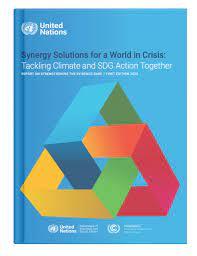
https://sdg.iisd.org/news/co-benefits-of-climate-sdg-synergies-far-outwe...
A UN report prepared by a group of independent experts calls for governments to tackle the climate and sustainable development crises together, to maximize the impact of policies and actions. The first of its kind, the report argues that by leveraging synergies between climate change and the SDGs, “we can also bridge investment gaps worth trillions of dollars.”
The report titled, ‘Synergy Solutions for a World in Crisis: Tackling Climate and SDG Action Together,’ shows there are strong “win-win synergies” between addressing climate change and achieving the SDGs. It finds that the 2030 Agenda for Sustainable Development and the Paris Agreement on climate change are mutually reinforcing and that advancing their implementation simultaneously can have significant co-benefits for both agendas, which “far outweigh trade-offs.”
For example, as per the report, under existing climate policies, an annual investment of USD 27 billion would be needed to achieve universal electricity access in sub-Saharan Africa by 2030 (SDG 7). Without climate policies, this would require an additional USD 6 billion. Another example cited suggests that “stringent air pollution control and GHG mitigation measures would help bring 40% of the global population exposed to particulate matter levels below the [World Health Organization (WHO)] air quality guideline, with the largest improvements realized for India, China, and the Middle East.”
Achieving the Sustainable Development Goals and stabilizing our climate to build resilient societies are two sides of the same endeavor.
— UNFCCC Executive Secretary Simon Stiell
According to the report, evidence points to the synergies between climate action and 80% of the SDG targets. “Progress away from siloed approaches and towards integrated planning, implementation, and reporting is underway but needs to move much faster,” it underscores. Among obstacles impeding this process, the report highlights:
- Knowledge barriers, including the lack of: accessible, streamlined, and standardized methodologies; research, quality data, and comprehensive indicators at different levels and across all sectors; and capacity, as well as inadequate understanding of ways to address distributional impacts;
- Political and institutional barriers, including those related to governance and institutional settings, short-term political cycles, and the lack of clarity on the distribution of accountability; and
- Economic barriers, including inadequate funding, competing economic priorities, high or unclear transaction costs, and in some cases trade-offs.
The report shows that synergies are “highly dependent” on the national context and national priorities. For instance, in the Global South, synergies are often observed between greenhouse gas (GHG) emission reduction goals focused on regulating land use and several SDGs. In the Global North, synergies can often be found in the region’s efforts to achieve a clean energy transition.
As a way forward, the report proposes a “framework for action” to foster systemic change towards synergistic action, underpinned by five principles: 1) indivisible but diverse; 2) context sensitive; 3) justice; 4) global solidarity; and 5) transformative.
A set of ten forward-looking recommendations for accelerated action on climate and SDG synergies address two critical questions: “Why is synergistic action not happening at the necessary level?” “What needs to be done to make it happen?” The recommendations call for, inter alia: collaboration, cooperation, and institutional capacity building; strengthened science-policy-society interaction; and policy coherence and coordination among policymakers across sectors and departments.
The report was launched in New York, US, on 13 September 2023, in the run-up to the SDG Summit. It was prepared by a 14-member expert group, co-led by Luis Gomez-Echeverri, Emeritus Research Scholar at the International Institute for Applied Systems Analysis, and Heide Hackmann, Director of Future Africa, University of Pretoria, South Africa. The UN Department of Economic and Social Affairs (DESA) and the UNFCCC Secretariat co-convened the expert group to produce the report.
According to a press release, the dialogue and engagement on synergies, including through the Fourth Global Conference on Climate and SDG Synergies in July 2023, will continue through the UNFCCC Regional Climate Weeks and other avenues. A fifth global conference is being planned in 2024. [Publication: Synergy Solutions for a World in Crisis: Tackling Climate and SDG Action Together: Report on Strengthening the Evidence Base] [Publication Landing Page] [DESA/UNFCCC Joint Press Release]









